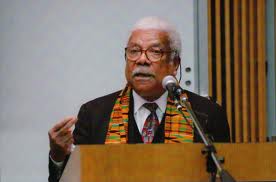Professor Ali Mazrui leaves behind a long trail of genuine scholarship, something that is rare in our current education climate.
Professor Ali Al’amin Mazrui was a man of contradictions. But before delving into that, let us recognize his stellar scholastic career that began in rural Mombasa schools, sped through England’s Manchester University, veered into New York’sColumbia University and later, Oxford University. Unlike most African professors schooled abroad, Mazrui’s speech reflected true scholarship. He went through his studies, and fortunately, his studies went through him. He used the content he tackled in his studies to carve his own ideas, most of which sought to criticize, constructively, the Western consumption appetites that Africans have sheepishly aped but left behind the productive initiatives that come with such appetites. A stretch of this idea is the silly penchant for African first ladies to shop expensive merchandise in New York, London, Paris, or Belfast while such goods cannot be manufactured locally. Dr. P.L.O Lumumba, a distinguished orator, can easily agree with Mazrui in his now famous observation that Africa produces what it does not consume and consumes what it does not produce. I would add that Africa produces what it does not want to consume.
Mazrui served many institutions in top positions around the world. At one point, he led the Makerere University Political Science department. He has served as the Albert Schweitzer professor in the Humanities at Binghamton University, led Africana studies at Cornell University, and chancellor of Kenya’s Jomo Kenyatta University of Agriculture and Technology. In 2005, the Foreign Policy Magazine as well as UK’s Prospect Magazine declared him the 75th most intellectual individual in the world.
Mazrui was elected icon of the 20th century by Lincoln University, given the DuBos Garvey award for African Unity, and Millennium Tribute for outstanding scholarship. He has featured in films such asMotherland directed by Owen Alik and published numerous globally acclaimed books and papers. His book, Globalization and Civilization: Are they forces in conflict” is one of his many works dealing with social issues that have affected modern day life on a global scale. Africans: a Triple Heritage is Mazrui’s creation, a television series that explores forces that have impacted the lives of Africans in fundamental ways. Both the BBC and the PBS ran the series.
Mazrui was a compassionate intellectual who ever stood in opposition to the primitive accumulation of wealth while all else around is squalor. Several African dictators whose myopia drove them to loot public coffers while intimidating and threatening dissidents found a true enemy in Mazrui. He often found it easy to take off to safe havens such as the United States and the UK while keeping up the criticism on the primitivity of corruption in the midst of backbreaking poverty that has deprived millions of African children the chance to get even basic education, leave a lone a meal a day.
While his true scholarship received recognition abroad, President Moi and his allies would not recognize him. It was President Mwai Kibaki, an intellectual himself, who declared Mazrui a “shujaa” and awarded him the “Order of the Burning Spear,” a top accolade that the president gives to individuals who have made extraordinary contributions to the life of the nation.
Mazrui’s scholarly achievements should help guide the debate on mediocre education standards in modern day Kenya and bogus degrees being dished around to people who cannot even express themselves properly. Critical thinking and effective communication, the central tenets of education, are starkly missing from Kenya’s education system. Sex for grades, people getting assisted with their class work and earning degrees they have not worked for, and appointing ill-equipped people to spearhead important parts of the education system have all contributed in one way or another to the decline of Kenya’s education. It is worth noting that running one’s mouth does not a critical thinker make. Ideas decide whether one is a critical thinker or not.
The contradiction in Mazrui’s life was his often evident dislike for Western patronization of Africa- a theme he always kept alive in his work-and yet he schooled, lived and worked in Western capitals. For him to be laid to rest at home, his body must be flown from a Western capital. A contradiction! Was it a flaw? I do not know. Whether it was or not, we all have a fault in our stars. This eminent African scholar, an icon of African ability at scholarship, a master of the art of self expression, and the embodiment of original thinking has blessed us immeasurably through his well-led life. It is for the young scholars to go back to basics and find their true maps, the maps the likes of Mazrui used. I am sure Professor Wole Soyinka misses a friend. In the Parthenon of African scholarship, Mazrui joins another legend, Professor Albert Chinua Achebe, another icon we lost, not long ago.
Professor Mazrui is survived by his wife Pauline, and six children. We thank them for supporting such a wonderful man and agreeing to share him with the world. The world is a better place because he lived. His ideas will illuminate many paths for ages.
By Onchari Oyieyo
For the Centre for African Progress Team.


